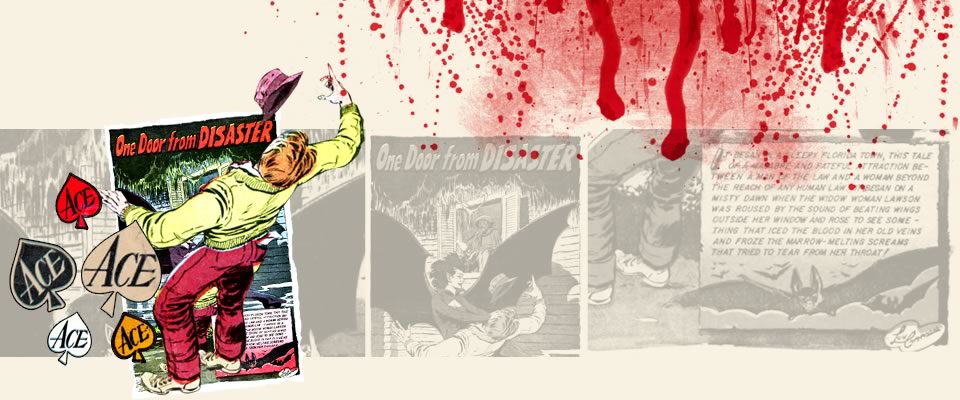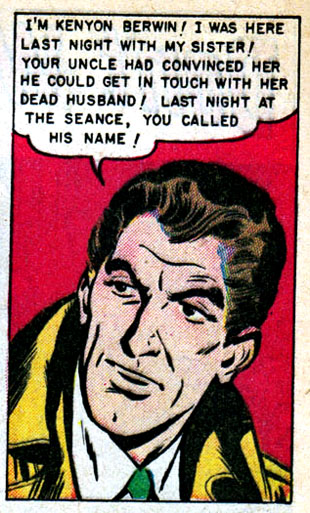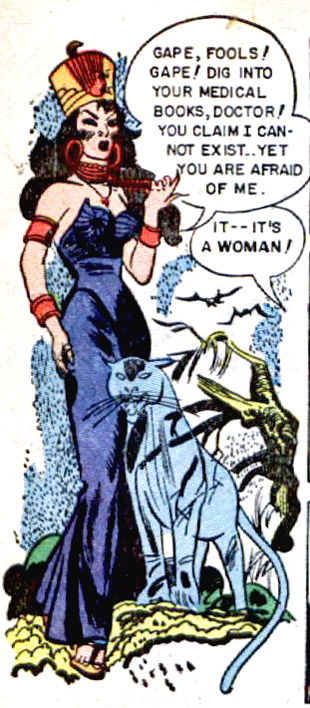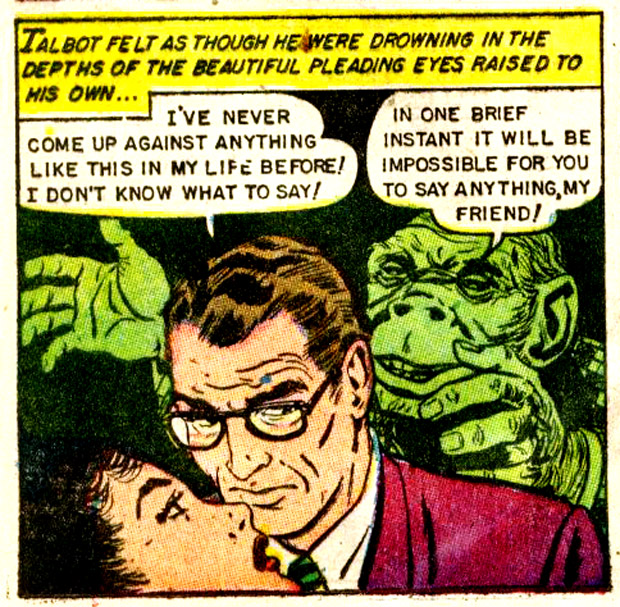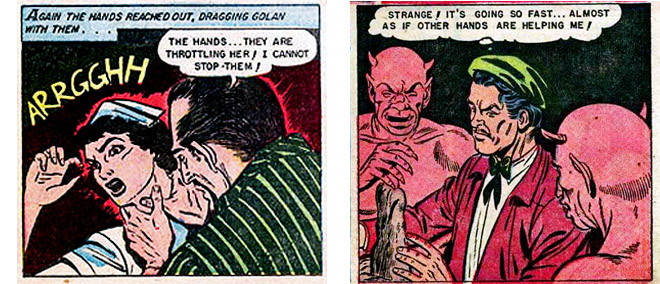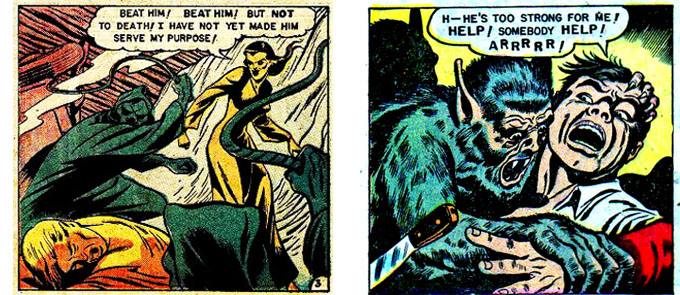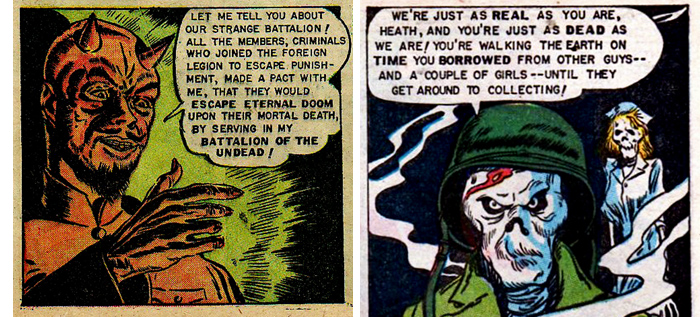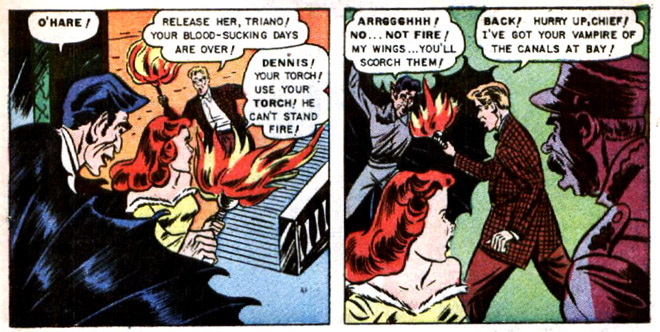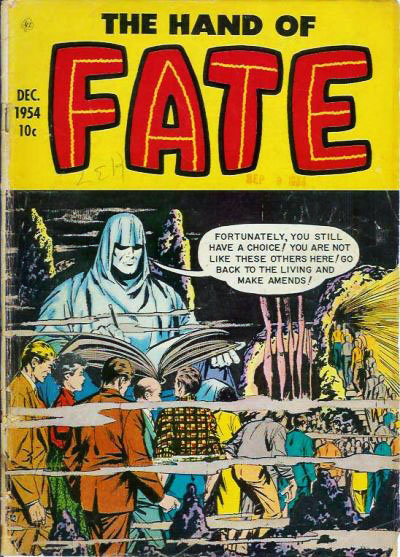ACE – the Forgotten Company
Up to now no one has ever taken a closer look at one of the “big players” of the comic book heyday of the 1940s and 50s : Ace Magazines.
They covered every genre popular from 1940 to 1956, but never generated a memorable superhero, never got to be the market leader, never pioneered in any direction and were generally overshadowed by the garish, lurid and (mostly!) inferior products of the competition.
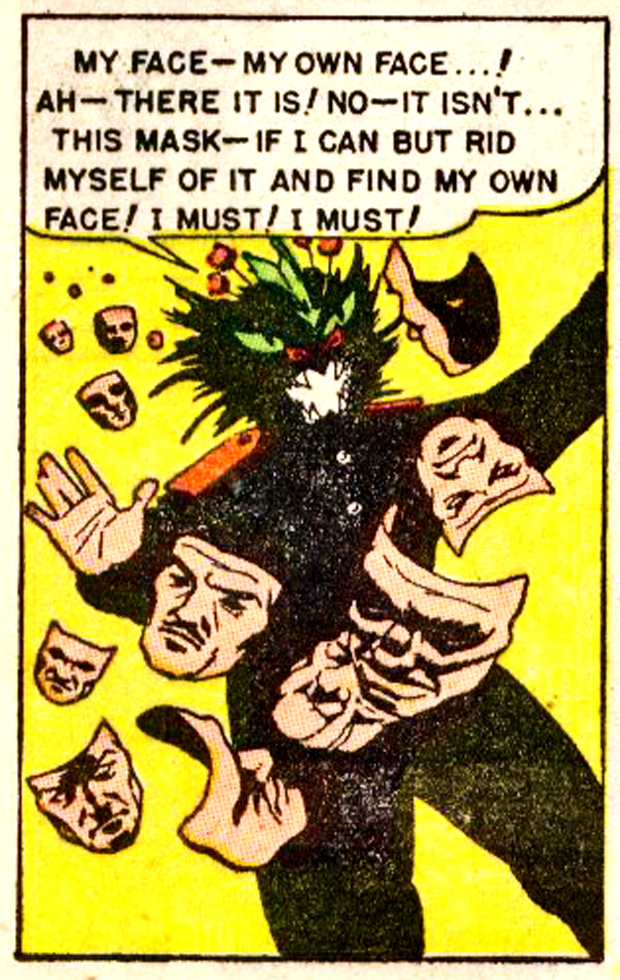
Ace artist – Lou Cameron
Ace just did good work. Their romance, their crime, their horror books were clearly above average and have been nefariously underrated. This website is a first step towards recognition. An appreciation of their writers and artists. ACE HORROR is a tribute to the Ace horror comic books.
Let’s delve right into it – to prove our main point: Ace excelled with more than solid, sometimes even brilliant, artwork. And not only by their most prominent artist: Lou Cameron.
About 24 artists worked more or less regularly for Ace’s horror books. Some did just 3 stories, some did 13, some did 30 or more. The output of Ace horror lore amounts to a total of 359 stories (101 books, 4 stories in each book, minus 2 from WEB’s last issues who featured only 3 stories, minus 43 reprints).
The most prolific are Lou Cameron, Jim McLaughlin, Ken Rice and Louis Zansky. These four artists grew and developed their fine styles under Ace’s roof. They came aboard early on, stayed until the end and worked not only on the horror titles.
They are hereby labeled as Ace’s “Big Four”.
It’s a sad footnote of comic history that the avant-garde of Ace left business in 1955. So did fellow colleagues George Appel, Richard Case, Al Eadeh, Maurice Gutwirth, Lin Streeter and Bill Walton. Never drew a comic story again. Not necessarily on voluntary terms.
The establishment of the Comics Code Authority shrank the market and destroyed hundreds of jobs for illustrators and authors (a harrowing, 15-page long list can be found in David Hajdu’s censorship thriller „The Ten Cent Plague“, Picador, 2008).
ACE HORROR wants to keep the memory alive and presents wonderful artwork by unduly forgotten artists.
But let’sbegin with Ace’s figurehead, their most prominent artist:
LOU CAMERON
“Had he filled the slot at EC that Jack Kamen held, he would be acclaimed to the skies,” says comic historian Hames Ware.
Cameron seems to enter the field in late 1951, doing his first crime and horror stories for Ace. He begins as part of a creative duo: Rocco Mastroserio is his constant partner on inks.
Cameron did not sign his work at first. He will do so from the summer of 1953 on.
In between the partnership with Mastroserio breaks up and Cameron is on his own – and he has to struggle!
His first solo jobs are of a rather crude nature, but no one learns as fast as Cameron. He improves from issue to issue. In 1954 he creates nothing less than breathtaking layouts and graphic visions hardly paralleled in his time. Cameron’s best known works are not his stories for Ace, but probably his contributions to Gilberton’s “Classic Illustrated” series. Such as “The Time Machine”, “War Of The Worlds” and “Dr. Jekyll And Mr. Hyde”.
After ten years as a cartoonist, he laid his brush aside and began a career as a writer of Western novels as well as a biography of Ronald Reagan. His graphic work is only known to insiders. Final word again by Hames Ware: “No list of comic book artists will ever be complete if the top six artists don’t include Lou Cameron.”
JIM MCLAUGHLIN
Enters the scene at Ace in mid 1951 and gets to be the main work horse around the company. He’s probably very fast with his pens and brushes, because no one gets assigned as much stories as he does. McLaughlin proves to be an all-rounder, working on crime and horror and even doing many covers.
He inclines to drawing stereotyped men and women.
He is easy to spot, because he always draws the same man (see figure above).
McLaughlin’s style will be going through three phases. His sometimes awkward beginnings and ascent, his peak in late 1953/ early 1954 (when he seems inspired by the work of his colleagues Cameron and Rice) and his decline (where he just doesn’t seem to care that much any more).
LOUIS ZANSKY
No wonder this artist has been mistaken for Gene Colan or Bernie Krigstein. There is a „flow“ to his illustrations which we have seen in these other masters.
Zansky baffles the beholder with inspired artwork from all of his creative years. I don’t see “phases” in his work, he starts at the top and never comes down. A fascinating artist I never had heard of before I took a look at Ace comic books. Zansky starts out at Gilberton in the mid 1940s and comes over to Ace.
I’ve not yet found the first Zansky Ace story, probably a crime job in 1948. But he stays until the end, he does the last covers Ace will publish. Zansky is the man who turns off the lights.
Special Zansky trademark (and art spotting hint): gnarly trees! Really, wherever he can, Zansky puts bare-branched, old, gnarled trees into the picture. Look out for it.
Postscript July 2013: Looks like he did covers for Fox magazines before coming to Ace. You won’t find it on Grand Comics Database (and I didn’t punch it in, cause it’s just a guess), but I’m seeing his dynamic style on many impressive title pages for Fox crime and western books in 1948 and 1949.
Mind you, just crime and western – and just in this period of time. The same artist drew most (sometimes all) of the covers of WESTERN KILLERS, WESTERN TRUE CRIME, FAMOUS CRIMES, JOURNAL OF CRIME (one-shot), MARCH OF CRIME (first series), MURDER INCORPORATED, TRUTH ABOUT CRIME (one-shot) and CRIMES BY WOMEN as well as WOMEN OUTLAWS.
I think it may be Zansky. Three of those covers feature gnarly trees in the background. And gnarly trees were – as the insider knows – Zansky’s secret trademark! Jerry Bails’ WHO’S WHO does indeed credit the guy with doing covers for Fox…
And art spotter Jim Vadeboncoeur, Jr. confirms our suspicions about Zansky doing covers for Fox!
KENNETH (KEN) RICE
Worked exclusively for Ace from around 1949 to 1955. Underrated and elegant artist, reminds me of Bob Powell (also drawing those round, rosy, well-fed faces).
Mainstay of their crime, war and horror books.
Did he do romance? We haven’t looked into Ace’s many many romance titles yet. One of Ace’s “Big Four”. Not to be confused with early 1940s comic pioneer PIERCE Rice!
Postscript August 2013: Yes, he’s in there as well. But no one has dared to study the dozens and dozens of Ace romance books. Pre-code horror is still the most satisfying genre.
Rice went on to do commercial art for Marsteller Gebhardt & Reed (now Burson-Marsteller), and later went free-lance. His largest and longest customers included Ingersoll Rand, the American Bible Society and how-to books from Reader’s Digest (as his daughter informs us).
MIKE SEKOWSKY
This guy spent decades in the business. He started out when Marvel used to be called Timely and worked on Captain America and The Young Allies.
Sekowsky only did a three-year freelance stint at Ace. He is a prominent contributor up to autumn 1952 and present in almost every issue.
His style is sharp and effective, Sekowsky loves to shift “the camera” around. Sekowsky’s trademark are little, silhouetted figures in landscapes, often drawn in a slightly abstract way.
He’s difficult to spot, though, because a lot of artists in the early 1950s had that kind of look. Frankly, I sometimes can’t tell a Sekowsky from a Bill Walton or a Ben Brown.
I don’t count him as a member of the “Big Four” (with him included it would have been a “Big Five”), because he leaves the outfit at the end of 1952.
“ACE Baker”/ Frank Giusto – Incognito Artist
From the early ACE-horror books one draftsman stands out who intoxicated his readers with clear and clean lines – and arranged especially great looking ladies in the foreground of his panels.
Some historians discover a relationship to the Good-Girl-champion Matt Baker; others credit him directly with these stories.
„Art spotter“ Jim Vadeboncoeur, Jr. worked extensively on the phenomenon, but found this artist not to be Matt Baker. Because no other name has surfaced until today, Vadeboncoeur named the unknown master „ACE Baker”.
An imitator, if you will, who seems to have worked exclusively for Ace books.
Maybe the Matt Baker biography (announced to come forth for over a year and a half, and now finally published!) is capable of shedding some light on this dire matter.
So the mystery is: Who is “Ace Baker” – and whither does he vanish?
Postscript December 2012: I know who’s behind the nickname, but I’ll hold out till I get a copy of that book…
Postscript January 2013: Fine. Books’s out; everything’s being disclosed now. „Ace Baker“ has been outed as Frank Giusto, a friend and collaborator of Matt’s. Giusto did the odd job for Ace, while Matt never worked for the company.
BILL MOLNO
Started in pre-code horror books, helped out at Ace and spent the rest of his life with Charlton. He sometimes teamed up with Charles Nicholas, who followed him there.
Molno’s trademark: those long drawn-out faces, looking slightly dumb and dull! Their mouths even tend to stand open… Jeez.
CHIC STONE
Worked around the industry almost everywhere doing almost everything. Special mention: his “second” horror career for the infamous Eerie Publications from 1969 on. Stone created extremely gory black-and-white horror stories like “Blood Bath”, “Voodoo Terror” or “The Slimy Mummy”. Stone’s trademark: the eyebrows, of course. No one else ever came up with the idea to draw eyebrows in a zig-zag. Stone does.
SY GRUDKO
One of the very few discoveries I can actually claim to myself. Comic history so far credits him only with Ace crime stories in 1949 and some work for Atlas/ Marvel. Jim Vadeboncoeur, Jr. told me the name, and I found a signature in one of Ace’s horror yarns. From there on his artwork popped up in over a dozen stories and in almost all of those one-page “fillers” Ace used in its horror comic books. Those alone ran from 1950 to 1955 and amount to a total of nearly 200 pages.
Grudko has to count as a regular Ace staffer. Next to Ace crime he worked on the Ace war titles, too. He is – let’s be frank – not that good an artist. But his dark and moody settings blend quite nicely into the Ace horror oeuvre.
CHARLES NICHOLAS
One of the unsung veterans in comic book business. Began his run 1940 at Fox and has been all over the place. Mainly remembered as Charlton artist, but worked for almost every publisher in the field.
Joins the Ace horror crew around autumn 1952, stays just for some months and was obviously hired as a kind of rapid deployment force.
Ace puts out as much books as never before and needs every helping pen and brush. He is assigned to fill the series WEB OF MYSTERY.
Nicholas turns out excellent work. His clean and masterful style is a welcome addition to Ace horror books. He lacks the dynamics of Cameron, Streeter or Zansky. He isn’t as moody as McLaughlin, Sekowsky or Grudko. But Nicholas is really nice to look at.
He adds color to the rainbow. He is to Ace what Reed Crandall is to EC.
LIN STREETER (Lyndsay Robert Streeter)
The “Who’s Who of American Comic Books” doesn’t mention his horror work for Ace, but Streeter contributed a full dozen stories. And they are fun to look at!
Here’s an artist really fit for horror. Streeter acts as a crossover of Sekowsky and Zansky: solid, powerful artwork, a bit cartoony – thus adding a layer of irony to his illustrations.
I had never heard of Lin Streeter before opening an Ace magazine. Allegedly he worked for the horror books from ACG as well. I will look into that… So for the while being, enjoy another artist worth discovering.
Postcript March 2015:
Streeter’s grandson Cody contacted us with helpful information:
„He did indeed do work for ACG, as well as his more famous work during World War 2. He was a cartoonist who worked on propaganda, he is most famous for his Private eight ball comic which can be seen in the IVY Leaf and Army times magazine. He did a lot of cartoon drawings for Marvel before they became Marvel as well. „The American Patriot“ who eventually became Cpt. America“.
DICK BECK
Being no master of graphic storytelling, Beck didn’t last long in comic book business. Not even a hundred stories have been credited to him (so far!). He produced mostly horror for the usual suspects: Ace, ACG, Story, Atlas/Marvel and St. John. And that is absolutely his forte!
There’s a melancholy and a sickliness about Beck’s characters which is fascinating to observe. You almost expect them to break out in sweat any moment (like a Rudy Palais stereotype). Dick Beck’s illustrations look like the misshapen alter egos of drawings by Charles Nicholas.
RICHARD CASE
Please welcome the next forgotten figure from our fifties horror cabinet.
Rumored to have worked for Fiction House’s golden age books, Case pops up at Ace in the early 1950s. This guy’s panels look like the misshapen version of Dick Beck’s ones!
Case has got a slightly awkward style, his trademark are those faces crumpled like raisins.
He appears only on the margins of Ace’s horror opus. He deserves to be mentioned – and in our “Stories”-section you will find his best work.
Not to be confused with the contemporary artist of the same name – yes, there is another Richard Case. But I don’t know what he looks like…
GENE COLAN
Although he did only six stories for Ace’s horror mags, his name is probably the best known in our line-up of artists. Colan’s body of work is enormous and most impressive. He contributed more horror to Warren’s black and white magazines from the mid-60s on and illustrated Marvel’s entire run of “Tomb of Dracula” (1972-1979).
He appeared side-by-side with Louis Zansky in one Ace horror book (BEYOND #17).
For style comparison click HERE see this issue on the Digital Comic Museum. It’s Zansky in the first and Colan in the last story…
MAURICE GUTWIRTH / GEORGE APPEL
This double credit indicates ignorance. It’s either one of those two artists who worked in the 1940s comic book industry. Both are hardly documented.
Appel is rumored to have been with the Iger studio and having worked for Fiction House mainly. His trace is lost in 1946.
The same goes for Gutwirth. Iger man and also at Fiction House. Gets lost in 1949. Maybe they are the same person…
So we don’t really know who is drawing our Ace horror stories in the 1950s. Art spotting guru Jim Vadeboncoeur, Jr. guesses it’s either one of those unknown golden age pioneers. All we really know is that six stories show this kind of artwork.
Postscript September 2012: After having found a signed Gutwirth story in WINGS COMICS #120 from 1953, I am confident that we can credit all our findings to him. And push Appel out of the picture. Maurice Gutwirth is a veteran from the late 1930s, working all around the industry – and having contributed to Ace books before (SUPER-MYSTERY COMICS, FOUR FAVORITES). He is a crude artist, drawing distorted faces – and thus quite fitting for the horror genre.
Postscript September 2013: Gutwirth is often mistaken for 40s crime artist Paul Gattuso. I suspect there is no work by Gattuso past 1950. But many art spotters and all the databases will tell you differently.
Assignment Ranking of Ace Horror Artists (number of jobs in brackets)
| Jim McLaughlin | (58) | |
| Lou Cameron | (52) | 16 with Rocco Mastroserio |
| Ken Rice | (35) | |
| Louis Zansky | (34) | |
| Mike Sekowsky | (31) | |
| Bill Molno | (17) | |
| Chic Stone | (16) | |
| Sy Grudko | (15) | |
| Charles Nicholas | (14) | |
| Lin Streeter | (12) | |
| Frank Giusto (“Ace Baker”) | (11) | |
| Dick Beck | (8) | |
| Richard Case | (6) | |
| Maurice Gutwirth | (6) | |
| Gene Colan | (6) | |
| Mario Rizzi | (4) | |
| Martin Rose | (3) | |
| Bill Walton | (2) | |
| Al Eadeh | (2) | |
| Jerry Grandenetti | (2) | |
| Rudy Palais | (2) | |
| Paul Parker | (2) |
Each 1: Al Hartley, Jay Scott Pike, Bill Discount, Dick Ayers, Edward Goldfarb, Larry Woromay, John Belfi and Howard Larsen. Some stories are still unidentified, but we got 346 out of 359 – and only 13 stories remain mysterious.
Postscript March 2012: Looking recently through an Atlas horror mag, a suspicion crept up on me. I started comparing books and stories and am positive now to have found Myron Fass as an Ace horror contributor. Fass has been credited in the „Who’s Who of American Comic Books“, but we overlooked him till now. Before entering Fass in our list, I will get Jim Vadeboncoeur, Jr.s advice.
Post-Postscript April 2012: Sadly, Jim could not confirm a single one of my Fass-sightings. So I cooled off my enthusiasm and just state a possibility here and there. Problem with Fass is his unpredictable range of style. He could be really good. But most of the time was not.
Spotlight: The Company
Although Ace’s publishing indicia refer to a mail address in Meriden, Connecticut, they ran „editorial and executive offices“ in downtown Manhattan. Otherwise it would not have been possible to acquire artists and to distribute the jobs to them.
The office on 23 West 47th Street is located in the heart of Manhattan, near Rockefeller Center and Radio City Music Hall. Sounds fancy, but was quite normal. EC had its premises at the border of Little Italy in the south, and Atlas/Marvel actually resided directly in the Empire State Building.
They all had their offices in Manhattan, they had to. Even in those days, New York happened to be a giant melting pot and art producing pool. Some say it was a giant art producing pot and a melting pool (if you count in all those bars and restaurants the artists used to hang out)…
We said that Ace was a “big player”, so I gathered some data – for comparison.
| Ace Magazines | 1940-1956 | 53 Titles | 673 Issues |
| Ajax-Farrell | 1951-1958 | 58 Titles | 305 Issues |
| Amerian Comics Group | 1943-1967 | 62 Titles | 1.230 Issues |
| Avon | 1945-1955 | 126 Titles | 386 Issues |
| Charlton | 1943-1986 | 382 Titles | 6.479 Issues |
| Comic Media | 1950-1954 | 14 Titles | 103 Issues |
| D.S. Publishing | 1947-1951 | 17 Titles | 75 Issues |
| Fawcett | 1940-1954 | 149 Titles | 2.383 Issues |
| Fiction House | 1939-1954 | 30 Titles | 826 Issues |
| Fox | 1939-1951 | 144 Titles | 665 Issues |
| Harvey | 1940-1994 | 368 Titles | 7.053 Issues |
| Hillman | 1940-1953 | 24 Titles | 407 Issues |
| Key Publications | 1951-1956 | 30 Titles | 150 Issues |
| Magazin Enterprises | 1943-1958 | 79 Titles | 579 Issues |
| Prize Comic Group | 1940-1961 | 36 Titles | 830 Issues |
| Quality | 1938-1956 | 64 Titles | 1.670 Issues |
| Star Publications | 1949-1954 | 50 Titles | 269 Issues |
| St. John | 1947-1958 | 131 Titles | 875 Issues |
| Story Comics | 1951-1955 | 6 Titles | 67 Issues |
| Superior | 1945-1956 | 144 Titles | 659 Issues |
| Toby/Minoan | 1949-1955 | 58 Titles | 298 Issues |
| Trojan Magazines | 1950-1955 | 6 Titles | 60 Issues |
| Youthful | 1949-1953 | 19 Titles | 109 Issues |
| Ziff-Davis | 1948-1957 | 57 Titles | 201 Issues |
These numbers are difficult to evaluate, but you can see that Ace was no small fry.
Concerning the horror comic book sector, Ace was as productive as rivals EC and Harvey, only surpassed by ACG and Atlas/Marvel.
The company is run by former pulp magazine publisher Aaron Wyn and his wife Rose. Like many publishing companies of this time, Ace appears as an impenetrable conglomeration of subsidiaries and affiliates. The four horror titles alone operate under various „imprints.“
BEYOND at first under “Ace Magazines, Inc.”, then under „Unity Publishing Corporation“, WEB OF MYSTERY comes out at “Ace Books, Inc.”, later on at “Ace Periodicals, Inc.”, finally at “A. A. Wyn, Inc.”. BAFFLING MYSTERIES are released at “Periodical House, Inc.”, and HAND OF FATE under the signet “Humor Publications, Inc.”, later on at “A. A. Wyn, Inc.”. The cover however, always emblazoned with the “ACE” logo.
Spotlight: The ACE Logo
We find the Ace logo (a stylized ace of spades) to be the most beautiful of all the comic book company logos. It is really pretty. But the company didn’t care that much for it. They moved their logo randomly around all over the upper half of the title page.
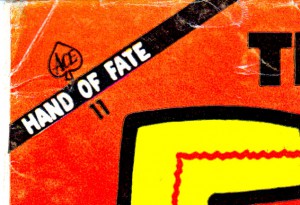 From summer 1953, it is banned (in a minimized form) into the upper left corner of the cover, almost coyly hidden behind a crossbar with the name of the series.
From summer 1953, it is banned (in a minimized form) into the upper left corner of the cover, almost coyly hidden behind a crossbar with the name of the series.
Under the crossbar appears a number that indicates the month of publication. Curiously, the release date (e.g. “Jan.”) will also be marked in letters next to, above or below the series name.
Rival publisher Atlas/Marvel invents this kind of crossbar labelling in May 1953 (JOURNEY INTO MYSTERY #8, MENACE #3, ADVENTURES INTO TERROR #19, JOURNEY INTO UNKNOWN WORLDS #18 and MYSTERY TALES #11).
In June 1953 other titles follow suit (STRANGE TALES #19, SPELLBOUND #15, UNCANNY TALES #9, ADVENTURES INTO WEIRD WORLDS #19, ASTONISHING #25 and MARVEL TALES #115).
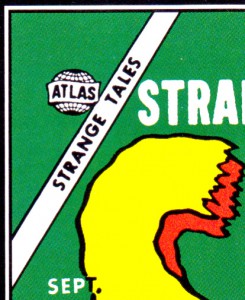 In July 1953 the trend reaches MYSTIC (from #21 on) and all of Ace’s titles.
In July 1953 the trend reaches MYSTIC (from #21 on) and all of Ace’s titles.
A strange peculiarity. Did the Wyns intend to assimilate themselves to the mass products of the competition? Did they even hope to be confused with them? To their own advantage?
In September 1953 Charlton takes over the crossbar with THE THING # 10 and Ajax-Farrell hops on the bus with STRANGE FANTASY and VOODOO in June 1954. All the other publishers have abstained themselves from this fad.
These are desperate times and the companies are playing hardball. It’s a cut-throat market out there.
Our next observation may also have something to do with it.
Spotlight: Publication Frequency
The publication frequency of Ace books changes briskly from monthly to bi-monthly and back again. Let’s have a closer look.
BEYOND’s frequency is highly erratic. It comes out bi-monthly, followed by a phase of monthly publication. Then again there may be a three-month interval. BEYOND follows no set pattern.
WEB OF MYSTERY gets it straigt: first bi-monthly, then monthly, and back again to bi-monthly.
BAFFLING MYSTERIES proceeds as follows: bi-monthly, then three times in a row monthly, back to bi-monthly, goes then to quarterly publication and finally settles for bi-monthly again.
What about the “pet of the family”- HAND OF FATE? No better. The meanwhile habitual mix-mode of monthly/bi-monthly, and in the end confusion rules.
The two last issues are released with only days between them and are both numbered “25”.
These are two completely different issues, mind you, with completely different content and different covers. This must have been a slip-up.
For identification reasons, historians describe these books with “25 a)” and “25 b)” – one came out in November 1954 (a), the other in December (b).
Looking at the overall picture of the company’s output one can tell: Ace begins gently.
They feel their way into the horror market with just 14 issues of BEYOND and WEB OF MYSTERY in 1951. At the end of that year two more titles are launched – BAFFLING MYSTERIES and HAND OF FATE. Ace goes into attack mode in 1952 and strives to take an active part in the horror boom.
Every month now they churn out two books, from spring on even three.
November 1952 marks the high point: Ace has a comic book from each series at the newsstand, they never topped that again.
At the beginning of 1953, the production suddenly takes a plunge (only seven books in four months), then picks up again, but does not reach the creative furor of the previous year.
In 1954, they just tread along. HAND OF FATE expires in November with that mysterious double number 25. The youngest member of the horror family dies first, which is odd.
Because the content of this series is best suited to carry on as a „code-approved“ item.
Fate’s pompous parables of destiny often provided the most tolerable moral reading matter.
Spotlight: Story Titles and Settings
Ace story titles sound wonderfully stiff and composed …
„Macabre“ seems to be a favorite word around the office – which I counted seven times:
“Valley of the Macabre”, “The other Side of the Macabre Mirror”, “Fury of the Macabre Mannequins”, “The Macabre Choice Between Two Doors”, “Macabre Ritual in Witches’ Glen”, “Dr. Chaney’s Macabre Cretion” and of course “Mirror Macabre”.
Ace horror is distinguished horror.
Other terms very en vogue include “Vengeance“, „Sinister“, „Scourge“ , „Phantom“, „Doom“, „Spectre“ or „Ghost“ and even a simple time determination as „Midnight“. All that evokes classic horror in a more literary fashion than the blatant promises of rival comic books.
You won’t find a story title like “I Crawl through Graves!” in an Ace magazine.
That exactly constitutes Ace’s trademark – a gentlemanly, a subtle, a highbred horror.
Ace horror stories are very often settled in France, Germany, England, Italy or in the “Balkan countries”. Period pieces and costume plays from another century. I didn’t make a count, but there are very few plots actually staged upon US-American soil.
The lettering of the stories is done by hand (the most common practice among comic books), but is replaced step by step with the mechanical Leroy lettering. By the end of 1952 there is solely Leroy letters in every Ace magazine.
This has one advantage: You can spot a reprint from early issues instantly.
See our discussion throughout the individual series.
Spotlight: The Covers
A characteristic of Ace cover images is that they (almost) all include a balloon, a text insert. A highly ambivalent affair, because this (almost) always produces involuntarily comical results.
A comic book cover is supposed to unfold an explosive graphic impact – without any words!
The most impressive covers in comic history fascinate by their clear and vigorous use of visual motifs. Words distract and disturb.
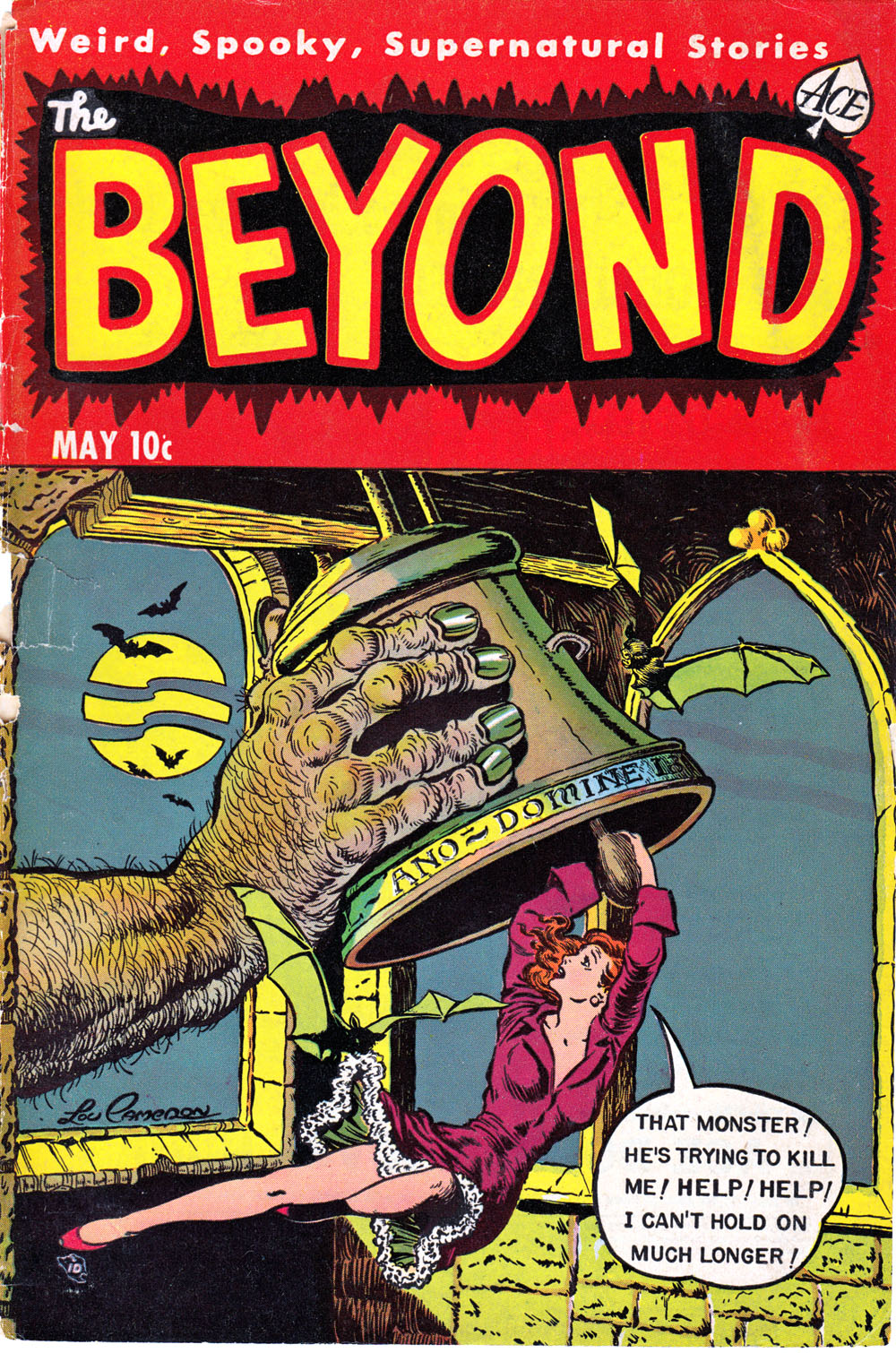 Ace didn’t think so. Their most beautiful cover is surely Lou Cameron’s art for BEYOND # 20. It is spoiled by the long-winded ballon which is just unnecessary.
Ace didn’t think so. Their most beautiful cover is surely Lou Cameron’s art for BEYOND # 20. It is spoiled by the long-winded ballon which is just unnecessary.
The cover design of Ace books is quite a mess. Apart from the just mentioned one, their title pages are never signed by the artists. The quality fluctuates unpredictably, only in phases is a design pattern recognizable.
Ace often banishes any aspect of mystery from its horror covers and seems to be compulsively obsessed to EXPLAIN what is going on. Who wants logic on the cover of a horror book?!
We come to the conclusion: Ace had bad, miserable and lame covers – fortunately!
Only because of this they have remained affordable on the collector’s market. Only because of this I have been able to purchase some issues by auction. Only because of this you are now looking at this website.
So always be thankful for bad covers.
And now… enjoy!
Note: ACE HORROR is a spin-off of the German website FIFTIES HORROR (presenting pre-code horror in general to an unsuspecting public). ACE HORROR specializes in the products of a certain company and is therefore drafted in the English language.The sister website FICTION HOUSE & STANDARD HORROR is already online.
Acknowledgements:
All the folks at the Digital Comic Museum (DCM) and the Grand Comics Database (GCD), who have been incredibly supportive – especially Yoc, Jochen and Ramon. Special mention goes to Mike Benton and George Suarez, who have been breaking ground for pre-code horror research in the 90s.
And of course a big hand (drumroll) for (you guessed it) Jim Vadeboncoeur, Jr., the man with all the wisdom and generosity.
Without his invaluable assistance, not a single comic book related project in the last twenty years (at least) would have ever taken off the ground.
Jim loaned me dozens of Ace comic books, which I scanned and uploaded to the Digital Comic Museum (DCM). Apart from their romance and funny animal titles, there’s a lot of Ace now publically and legally online. Almost complete!
Feel free to check ‘em out…
Appendix: ACE Chronology 1950-1955
To give you an overview of the company’s output, here’s a listing of all their comic books from September 1950 to November 1955.
Left column: horror books – Right column: every other comic book published in these years
|
September 1950 |
|
| October 1950 |
|
|
|
November 1950 |
|
| December 1950 |
|
|
|
January 1951 |
|
|
February 1951 |
|
|
March 1951 |
|
|
April 1951 |
|
| May 1951 |
|
|
|
June 1951 |
|
|
July 1951 |
|
|
August 1951 |
|
|
September 1951 |
|
|
October 1951 |
|
|
November 1951 |
|
|
December 1951 |
|
|
January 1952 |
|
|
February 1952 |
|
|
March 1952 |
|
|
April 1952 |
|
|
May 1952 |
|
|
June 1952 |
|
|
July 1952 |
|
|
August 1952 |
|
|
September 1952 |
|
|
October 1952 |
|
|
November 1952 |
|
|
December 1952 |
|
|
January 1953 |
|
|
February 1953 |
|
|
March 1953 |
|
|
April 1953 |
|
|
May 1953 |
|
|
June 1953 |
|
|
July 1953 |
|
|
August 1953 |
|
|
September 1953 |
|
|
October 1953 |
|
|
November 1953 |
|
|
December 1953 |
|
|
January 1954 |
|
| February 1954 |
|
|
|
March 1954 |
|
|
April 1954 |
|
|
May 1954 |
|
|
June 1954 |
|
|
July 1954 |
|
|
August 1954 |
|
|
September 1954 |
|
| October 1954 |
|
|
|
November 1954 |
|
|
December 1954 |
|
|
January 1955 |
|
| February 1955 |
|
|
| March 1955 |
|
|
| April 1955 |
|
|
|
May 1955 |
|
| June 1955 |
|
|
|
July 1955 |
|
| August 1955 |
|
|
|
September 1955 |
|
|
October 1955 |
|
| November 1955 |
|

